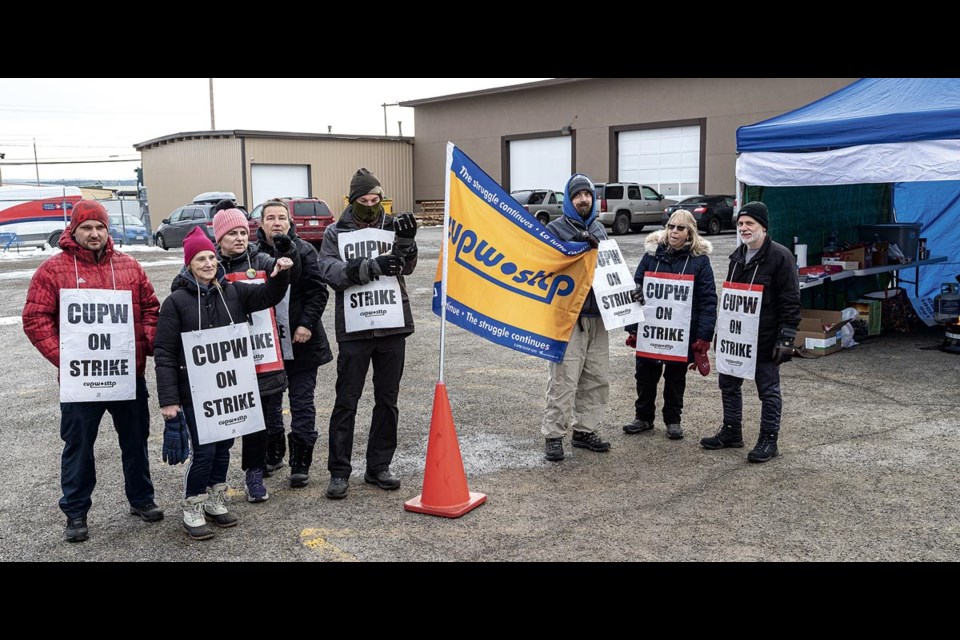An end to a month-long postal strike could be imminent, now that federal Labour Minster Steven MacKinnon has intervened, asking the Canadian Industrial Relations Board to review the state of negotiations and decide if the 55,000 striking workers should be ordered back to work.
If the board considers it unlikely a negotiated settlement can be achieved before the end of the year the union will be served a back-to-work order.
The Canadian Union of Postal Workers walked off the job on Nov. 15, after a year of bargaining failed to address their issues over better pay, job security, pension protection and how to staff weekend delivery services.
That includes 204 members of CUPW Local 812 from Prince George, Vanderhoof, Mackenzie, Burns Lake and Fraser Lake.
“Nobody’s happy with this decision, we’ve been out for a month and 55,000 workers across the county have been without a paycheque for a month, not to mention the small businesses and small communities that have suffered the last 29 days,” said Rick Harris, president of Local 812.
“Now they’re going to force us back, it’s astounding to me. They’re going to get together and look at it over the weekend and make a decision and that’s what I’m anticipating.”
The union issued a statement condemning MacKinnon’s action, calling it “an assault on our constitutionally protected right to collectively bargain and to strike.
“This order continues a deeply troubling pattern in which the government uses its arbitrary powers to let employers off the hook, drag their feet, and refuse to bargain in good faith with workers and their unions.”
If a negotiated settlement fails to happen and CUPW workers are forced back to return to their jobs they will be working under terms of the current collective agreement until May 22, 2025.
“While this provides a temporary solution, the government’s priority is to get the parties back on track to resolve the dispute and reach agreements” MacKinnon said, in a prepared statement.
“I am making this decision to protect the interests of all Canadians. It is not a decision I take lightly, but in this situation, it is the right one.”
There is still time to get back to the table and come to terms on a negotiated settlement but MacKinnon said it has to be soon, citing the detrimental effects of the strike on small businesses, charities, seniors, Indigenous people and residents of rural and remote communities.
Utility companies will continue to charge customers late fees if they do not pay their monthly bills in time and are urging people to switch to electronic billing to receive their statements. The onus is on customers, including those who still use paper billing, to find out how much they owe and submit their payments through alternate means such as a bank teller.
“This will be too late to salvage any of the Christmas holiday season for small businesses,” said Dan Kelly, president of the Canadian Federation Independent Business. “With a massive backlog, it will be nearly impossible for any new shipments to make it to Canadians before Christmas through Canada Post.”
CUPW lowered its wage demands to 19 per cent over four years, down from the 24 per cent increase it was asking when the strike began. Canada Post claims the latest union proposal would add $2.9 billion to the cost of running the postal service in that four years.
Canada Post registered losses of $3 billion since 2018. In 2023, the losses were $748 million and there was a $348 million drop in the third quarter of 2024, which the company says indicates an unstainable business model.
“The last offer that we provided to Canada Post was on Monday, so it’s been five days and they didn’t even respond to that,” said Harris.
The average hourly wage for Canada Post employees on Canada is $24.72. Prince George letter carriers earn between $20 and $27 per hour.
Postal workers are receiving strike pay that amounts to about $56 per day. Harris said if the back-to-work order is issued, workers will not be drawing strike pay once they return to their jobs and they will also be without a paycheque for the first couple weeks because of the pay structure which requires an accumulation of days worked before cheques are issued.
“We have people that are living pretty close to the edge right now,” Harris said. “We’re doing our best, we offered the services we can and we provided the information for people if they need help somewhere along the line. I would say there’s a lot of people that are members across the country that are hurting pretty bad. We’ve got some lean times ahead.”



